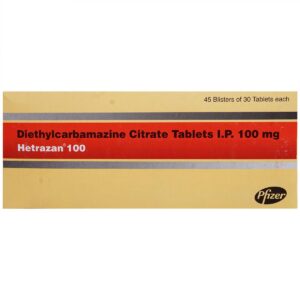DIETHYLCARBAMAZINE
DIETHYLCARBAMAZINE: Diethylcarbamazine (DEC) is an antiparasitic drug primarily used for the treatment of lymphatic filariasis, a parasitic disease caused by filarial worms. It is also sometimes used for the treatment of other parasitic infections, such as tropical pulmonary eosinophilia and loiasis.
The exact mechanism of action of diethylcarbamazine is not fully understood. However, it is believed to work by disrupting the metabolism and survival of microfilariae (immature forms of the parasite) and adult filarial worms. It has been shown to inhibit the growth and reproduction of the parasites, leading to their eventual death.
The dose of diethylcarbamazine may vary depending on the specific condition being treated. For lymphatic filariasis, the usual dose is 6 mg/kg of body weight taken once daily for 21 days. For other parasitic infections, the dose and duration of treatment may differ, and it is best to follow the instructions provided by your healthcare provider.
Some common side effects of diethylcarbamazine include dizziness, headache, nausea, vomiting, abdominal pain, and allergic reactions. Skin rashes, itching, and swelling may also occur. Rarely, more serious side effects such as liver dysfunction and neurological symptoms can occur, but these are generally rare.
It is important to note that diethylcarbamazine may interact with other medications, so it is crucial to inform your healthcare provider about any other drugs you are taking. Additionally, pregnant women and those with certain medical conditions, such as liver disease, should exercise caution or avoid using diethylcarbamazine.
Overall, diethylcarbamazine is an effective and commonly used medication for the treatment of lymphatic filariasis and other parasitic infections. However, it should always be used under the guidance of a healthcare professional, and any concerns or side effects should be promptly reported to them.

